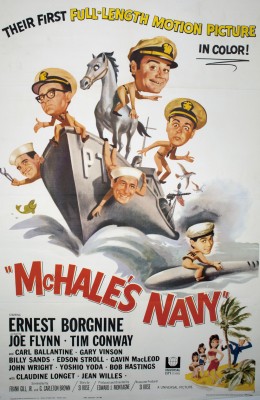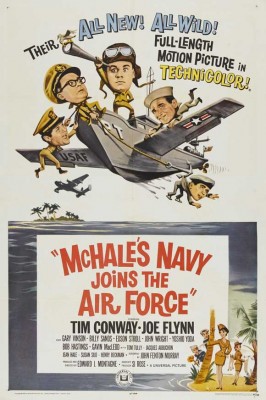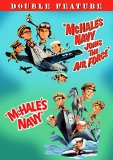| Reviews & Columns |
|
Reviews DVD TV on DVD Blu-ray 4K UHD International DVDs In Theaters Reviews by Studio Video Games Features Collector Series DVDs Easter Egg Database Interviews DVD Talk Radio Feature Articles Columns Anime Talk DVD Savant Horror DVDs The M.O.D. Squad Art House HD Talk Silent DVD
|
DVD Talk Forum |
|
|
| Resources |
|
DVD Price Search Customer Service #'s RCE Info Links |
|
Columns
|
|
|
McHale's Navy / McHale's Navy Joins the Air Force
Nonetheless, Universal continued making modest formula theatrical comedies, still more or less in the style of their Abbott & Costello, Ma & Pa Kettle, and Francis the Talking Mule programmers of the late 1940s through late ‘50s. When Jerry Lewis's career faltered during the second half of the ‘60s, Universal shrewdly hired Don Knotts to fill that family comedy void, beginning with The Ghost and Mr. Chicken (1966), and continuing with The Reluctant Astronaut (1967), The Shakiest Gun in the West (1968), The Love God? (1969), and How to Frame a Figg (1971). Meanwhile, several popular Universal-produced shows were turned into similarly modest, similarly budgeted feature comedies. Munster, Go Home! (1966) spun off from the 1964-66 sitcom, and two films sprang from the popular comedy McHale's Navy (1962-66): McHale's Navy (1964) and McHale's Navy Joins the Air Force (1966).
Movies like these hardly threatened to eclipse the stature of City Lights, The Bank Dick, or M. Hulot's Holiday but, by and large, they're unpretentious, mildly pleasant exercises in slapstick. Audiences that went to see these movies when they were new were hardly expecting Great Art; they just wanted to laugh, and these movies adequately complied.
Shout! Factory's Double Feature of McHale's Navy and McHale's Navy Joins the Air Force packs both 90-minute films onto a single-sided DVD with no extras, but the 1.85:1 enhanced widescreen transfers really look great.
Their plots are almost immaterial. In McHale's Navy, the misfit crew of the PT-73, on the island of Taratupa in the South Pacific in the latter days of World War II, find themselves thousands of dollars in debt after a off-track horse betting scheme goes awry and, later, when Ensign Parker (Tim Conway) destroys the dockside cargo of coffee beans of French businessman Henri Le Clerc (George Kennedy, in an amusing and surprisingly convincing performance). Parker's superior officer, Lt. Commander Quinton McHale (Ernest Borgnine), desperate, reluctantly agrees to marry old flame Margot Monet (Jean Willes), owner of a gambling parlor in nearby New Caledonia, in exchange for the dough. But then the crew of the PT-73 stumbles upon retired racehorse Silver Spot and plan a race they're all but certain to win. However, McHale's irritable, excitable Captain, "Old Leadbottom" Wallace B. Binghamton (Joe Flynn) and his toady, Lt. Elroy Carpenter (Bob Hastings), must be kept in the dark until the big race. Can McHale, Parker, and the crew (Gary Vinson, Bobby Wright, Carl Ballantine, Billy Sands, Edson Stroll, Gavin MacLeod, etc.) keep Binghamton at bay?
McHale is conspicuously absent from McHale's Navy Joins the Air Force. Star Ernest Borgnine wouldn't agree to the film without first approving the script, and/or he was already committed to appear in Robert Aldrich's excellent The Flight of the Phoenix (1965). Further, his "Navy" couldn't have joined the Air Force even if they had wanted to, at least not in 1943, when the picture it set. The Air Force was a branch of the U.S. Army until 1947.
In any event, the McHale-less story has Binghamton escorted to a staff meeting in Brisbane, Australia. He orders the crew of the PT-73 to remain aboard but the men, desperate for shore leave, switch uniforms with Russian crewmen docked alongside her. In a protracted series of mix-ups, Parker is mistaken for Lt. Harkness (That Girl's Ted Bessell), the playboy son of a general, while Harkness is mistaken for a Russian, arrested by NKVD agents (Henry Corden and Len Lesser) and unwittingly shanghaied aboard the Russian ship. For most of the rest of the picture, Parker and Binghamton try to locate Harkness while keeping alive the ruse that Parker is the infamous ladies man.
Neither film could be called a laff-riot. The mild sitcom from which they sprang was only fair-to-middling, a slapstick variation of Sgt. Bilko, but with Academy Award-winner Ernest Borgnine in place of irreplaceable, fast-talking comedian Phil Silvers. Bilko was tailor-made to Silvers's unique strengths, while in McHale's Navy that part was played by an immensely likable but slumming Oscar-winner. Instead, both the TV series and these two feature films rely heavily on the clowning of Tim Conway and Joe Flynn for laughs.
Conway had a background in local television, where singer-comedienne Rose Marie spotted him. She secured Conway a job on The Steve Allen Show. Following McHale's Navy Conway struggled for nearly a decade, including a stint on the disastrous Turn-On, a comedy variety series so bad it was cancelled after just one episode; and The Tim Conway Show, which briefly reunited him with Flynn. Of course, Conway made a big comeback during the final three seasons of The Carol Burnett Show, famously ad-libbing material and making his co-stars break character with uncontrollable laughter, material so funny these "mistakes" often made the final cut anyway.
Around this time, he and fellow Universal veteran Don Knotts became an unofficial comedy team, first in Disney's The Apple Dumpling Gang (1975), then anachronistic but oddly enjoyable comedies that strongly resembled their Universal features, notably The Prize Fighter (1979) and The Private Eyes (1980).
I would love to know what degree of latitude Conway was given on McHale's Navy and its two features. It sure looks like Conway was expected to follow scripted dialogue, then given a free hand to ad-lib bits of business on his own. While undoubtedly he had to work around the parameters of each scene, it does appear he was otherwise encouraged to clown at his heart's content. In a few scenes in both pictures, other cast members and extra seem to be trying to suppress laughter at Conway's comic ingenuity.
One thing even many of the worst ‘60s sitcoms got right was in casting wonderful talent as foils for their show's protagonists. Many of these were almost like secret weapons, guaranteed laugh-getters even when the material was weak and/or tiresomely repetitive: among the more famous were Richard Deacon (The Dick Van Dyke Show), Gale Gordon (The Lucy Show/Here's Lucy), Werner Klemperer (Hogan's Heroes), Edward Platt (Get Smart), Frank Sutton (Gomer Pyle, U.S.M.C.). Joe Flynn certainly was one of the best, on par with Paul Ford's wonderful foil for Phil Silvers on Bilko. A theatrical director, ventriloquist, radio DJ, and would-be Ohio politician, Flynn got into television from the ground-up, so to speak, beginning in the late 1940s. He played a variety of roles but quickly recognized audiences preferred him in comical parts. Following McHale's Navy, Flynn played similar roles in a series of Disney films before his untimely death in 1974, a drowning accident in his own swimming pool, possibly triggered by a heart attack.
Flynn was in his early 40s when he made the two McHale's Navy features but, admirably, he gamely allowed himself to take an awful lot of physical abuse in the name of laughter. While like a lot of ‘60s sitcom foils his character was pretty much limited to unlimited exasperation ("What is it? Wha-wha-wha?!" became his trademark) he's so good at it audiences didn't seem to care. His uniquely nasally voice was funny all by itself. In Joins the Air Force there's a ludicrous scene at the climax where Binghamton and Parker are trapped in an Army Jeep dangling from an airplane over the Pacific Ocean by a rope. A crow (in the middle of the ocean) lands on the Jeep's hood, prompting Flynn's line, "Well don't just stand there! Get help!" Not a particularly funny line, but Flynn's delivery turns it into a hilarious outburst in an otherwise routine picture. It's to Conway's and Flynn's credit that Borgnine's presence is barely missed.
Each film is a bit more elaborate than the TV show, with bigger, better-appointed sets, a bit of location shooting (though still mostly confined to Universal's backlot), more extras, etc., though probably each was made for around $600,000-$750,000.
Video & Audio
In striking contrast to the lackluster, older video masters Universal provided Shout! Factory for their release of the TV series, both McHale's Navy and McHale's Navy Joins the Air Force look great, with impressive sharpness and bright primary colors in these 1.85:1 enhanced widescreen releases. The packaging says "fullscreen" (sic) but that's incorrect unless by that they mean full screen on 1.78:1 widescreen TVs, which is more or less true. The mono audio, English only with no subtitles or alternate audio, is impressively strong. No Extra Features.
Final Thoughts
Hardly masterpieces of film comedy but not bad at all as family-friendly slapstick one pops into the player on a rainy Saturday afternoon, this unassuming double feature set is Recommended.
Stuart Galbraith IV is the Kyoto-based film historian and publisher-editor of World Cinema Paradise. His new documentary and latest audio commentary, for the British Film Institute's Blu-ray of Rashomon, is now available.
|
| Popular Reviews |
| Sponsored Links |
|
|
| Sponsored Links |
|
|
| Release List | Reviews | Shop | Newsletter | Forum | DVD Giveaways | Blu-Ray | Advertise |
|
Copyright 2024 DVDTalk.com All Rights Reserved. Legal Info, Privacy Policy, Terms of Use,
Manage Preferences,
Your Privacy Choices | |||||||

















